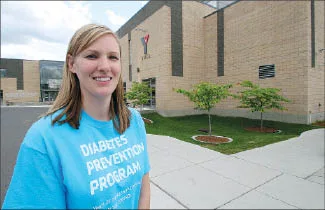Diabetes prevention program launches
Spokane-area YMCA among early adopters of national initiative

The YMCA of the Inland Northwest is an early adopter of a nationwide Diabetes Prevention and Control Alliance, a partnership that Minnesota-based health insurer UnitedHealth Group Inc. has launched with YMCA of the USA in an effort to slow growth of the debilitating disease.
Mindy Wallis, a healthy-living coordinator who is overseeing the diabetes prevention program for the YMCA here, says the program has started accepting enrollees for its first 16-week session, which is scheduled to start later this month at the Central Y, north of downtown Spokane at 1126 N. Monroe. As of early June, seven people had signed up.
The classes, Wallis says, are designed for people who are diagnosed as prediabetic or at high risk of developing type 2 diabetes, known informally as adult-onset diabetes. The goal of the program is to help participants live healthier and prevent or delay onset of the disease.
"We have two specific goals," Wallis says. "Lose 7 percent of body weight and work up to 150 minutes of physical activity a week."
The Spokane-area YMCA received a $50,000 grant earlier this year to launch the diabetes prevention program. Wallis says a handful of YMCA employees here have been trained as lifestyle coaches who will conduct the classes, which will teach participants about healthy eating and establishing exercise routines. Also, the program will teach skills intended to deter overeating, including coping with stress, combatting negative thoughts, and problem solving.
"It can all lead to inactivity and overeating," Wallis says. "All of these things can be triggers (for unhealthy activity)."
The program getting under way here is modeled after a similar program funded by the National Institutes of Health and the U.S. Centers for Disease Control and Prevention. The program showed that with modest weight loss and increased activity, 58 percent of prediabetic participants were able to prevent or delay the onset of the disease.
Tom Beauregard, executive vice president of UnitedHealth Group, said in a press release, "The pilot data showed that paying for these services works—people get and stay healthier, leading to dramatically lower health care costs for employers and the health care system."
According to CDC statistics from 2007, diabetes and its complications led to $174 billion in medical costs. At that time, nearly 24 million people in the U.S. had diabetes, and another 57 million people were prediabetic.
Wallis says prediabetes is a physician-diagnosed condition in which a patient has blood-sugar levels that are higher than normal, but not at levels high enough to be considered diabetic.
People who are considered at high risk of developing diabetes but who aren't yet diabetic typically have one or more of the following characteristics and conditions: obesity, high blood pressure, high cholesterol, a family history of diabetes, and have had gestational diabetes—a temporary type of diabetes that some women develop when they are pregnant.
Most of the people who will participate in the YMCA's new diabetes prevention program have been referred to the program by physicians. In the future, UnitedHealth plans to begin referring people it insures to the program here and will reimburse the Y directly. The insurer says it already reimburses YMCAs in other markets where the prevention program is up and running.
The cost for the 16-week program varies depending upon a participants income level and whether he or she is a YMCA member. For Y members, the cost ranges from $75 to $150. For nonmembers, it's $100 to $200.
Eventually, Wallis says, the diabetes prevention program likely will be available at each of the three Spokane-area YMCAs, and once it's fully operational, new sessions could start every six to eight weeks, she says.
While launched with a grant, the program should become self-supporting, Wallis says.
UnitedHealth started the Diabetes Prevention and Control Alliance last year in six test markets: Cincinnati; Columbus, Ohio; Dayton, Ohio; Indianapolis; Phoenix; and Minneapolis. Spokane was one of the communities that received grants to get a program up and running this year, and more communities are expected to launch programs later this year and in 2012.
Related Articles


_c.webp?t=1763626051)

_web.webp?t=1764835652)
